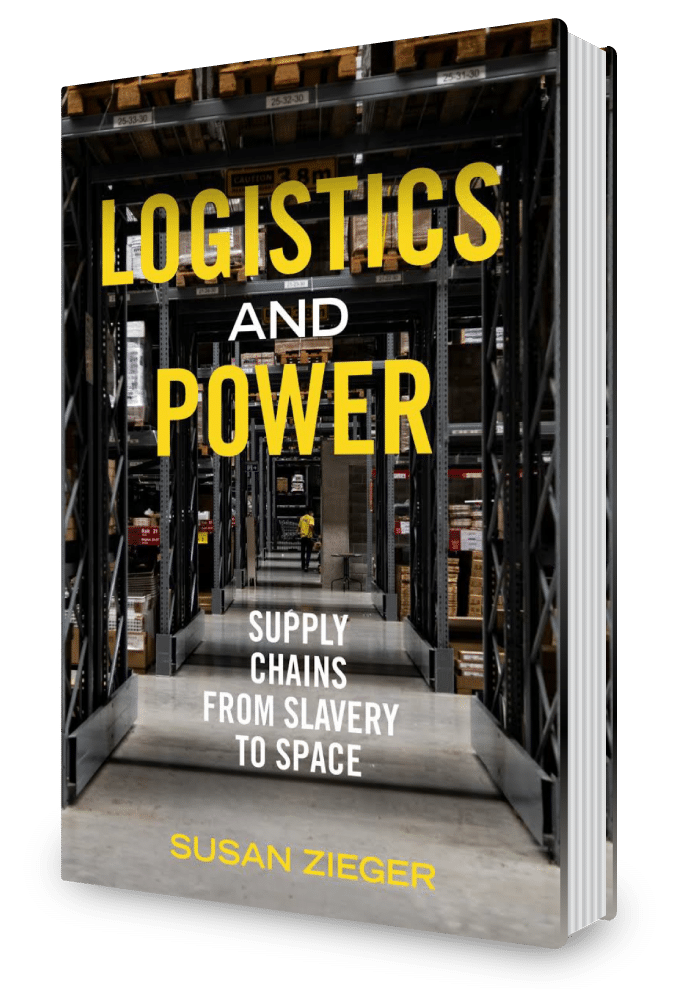
Title: Logistics and Power: Supply Chains From Slavery to Space
Author: Susan Zieger
Publication Date: September 9, 2025
Publisher: University of California Press
Formats: Hardcover, Ebook
Pages: 400
ISBN-10: 9780520402874
Buy Now:
Logistics and Power
Supply Chains From Slavery to Space
“It’s logistics.” Around the turn of the twenty-first century, middle-class Americans began using this phrase when planning our social events, work projects, and other details of everyday life. It conjures up the mundane activities of driving and emailing and meeting, of making reservations and ordering supplies, of coordinating people by text and group chat. In these contexts, logistics is everything but the main point. Not celebrating the birthday but ordering the cake. Not the new creative strategy but flying the whole department to the retreat. Logistics is never meant to be the focus, but it has a way of expanding to cloud the purpose that conjured it up. When we call minor organizational tasks “logistics,” we tacitly acknowledge that everyday modern life is complicated, requiring so much management and coordination that it can feel as urgent as delivering goods or positioning armies, its traditional tasks. Much research and writing has examined the stresses of modernity, but very little has studied their logistical nature.
When crisis erupts, logistics becomes the primary concern. Routing accident victims to a hospital with adequate staff and open beds. Persuading a coworker to cover your shift and a friend to pick up the kids when your parent has a stroke. Suddenly everything depends on the mundane activities of driving and texting and phoning and planning. But crises are supposed to subside. When they become normalized, everyday life transforms into an unending logistical operation, a constant low-level struggle against a nonspecific enemy. Anyone who grapples with chronic challenges—managing debt, unemployment, or a large family or coping with ongoing illness, addiction, or disability—sharpens their logistical skills. Such personal crises are impacted by wider economic and social damage: the prohibitive costs of health care and education, the outsourcing and automation of jobs, the defunding of local resources by austerity policies. If such changes are the effects of ordinary economic and political rhythms, then things might turn around and the cognitive and psychic burden lighten, because all the tasks will be minor again—just “logistics.” For those perpetually insulated from precarity, that label comes with the hint of smugness that comfort and safety bestow.
Yet there is also a new sense that the world has emerged from a relatively calm period into a “new normal” of climate crisis, political turmoil, economic instability, and armed conflict, with less confident expectation of a return to better days. Or perhaps the scale, force, and unpredictability of these problems are simply wearing thin the cushions of white, masculine, bourgeois privileges. When traditionally advantaged people find it harder to bounce back from adversity or pay their way out, “logistics” gets real for them. The working class, women, and people of color have long dealt with scarcity, exploitation, and violence by planning and replanning, constantly calculating, and treading carefully.
Juggling more than one job to pay the rent, finding time in the interstices to parent children, and avoiding racist police while walking, biking, or driving are skills aptly understood as logistical. They are the arts of the hustle.2 So too, anyone from an immigrant family knows that permanently leaving one’s country of origin—whether by plane, foot, or rubber raft—and resettling in a new country is an intensive logistical project. And across demographics, women traditionally supply, coordinate, and manage households and communities as unpaid logisticians. The closer we are to the bleeding edges of global economic and political change, the less euphemistic our everyday logistics seems. Whether we are entering together a new era of permanent crisis, or whether ongoing crises are growing larger and penetrating deeper, logistics increasingly serves as a straightforward term for coping with a faltering modernity. Making our way in the world turns all of us into logisticians.
Praise
for Logistics and Power
Logistical Power imaginatively weaves disciplines, geographies, and historical periods together to create a new, and truly exceptional, vision of the supply chain. A beautifully composed, counter-logistical story about one of the most complex objects of our time, this book is essential reading.
author of Media Hot and Cold and The Undersea Network
Through vivid storytelling, Logistics and Power reveals how supply chains shape our world. Zieger deftly weaves multiple narratives to show how logistics—far more than moving stuff around—functions as both physical infrastructure and conceptual framework, transforming our understanding of modernity, power, and resistance.
co-author of The Rest and the West: Capital and Power in a Multipolar World
Susan Zieger brilliantly exposes the subtle yet pervasive structures of logistical power and shows why reimagining them is key to a more just future. Zieger not only illuminates the circuits of exploitation at the heart of capitalism’s supply chains but also sketches out counter-logistical possibilities that resist this system and harness collective action. Her compelling prose invites us to move beyond convenience and guilt, urging us to envision a future where we can all move—and be moved—in more collective and transformative ways.
author of Speculative Communities: Living with Uncertainty in a Financialized World
We can think logistically about the world to the extent that it has become logistical. This book captures that change in flight, a bravura exposition of a world-picture coming into view as the lineaments of that world — our world — undergo their own sea change.
author of Riot. Strike. Riot: The New Era of Uprisings